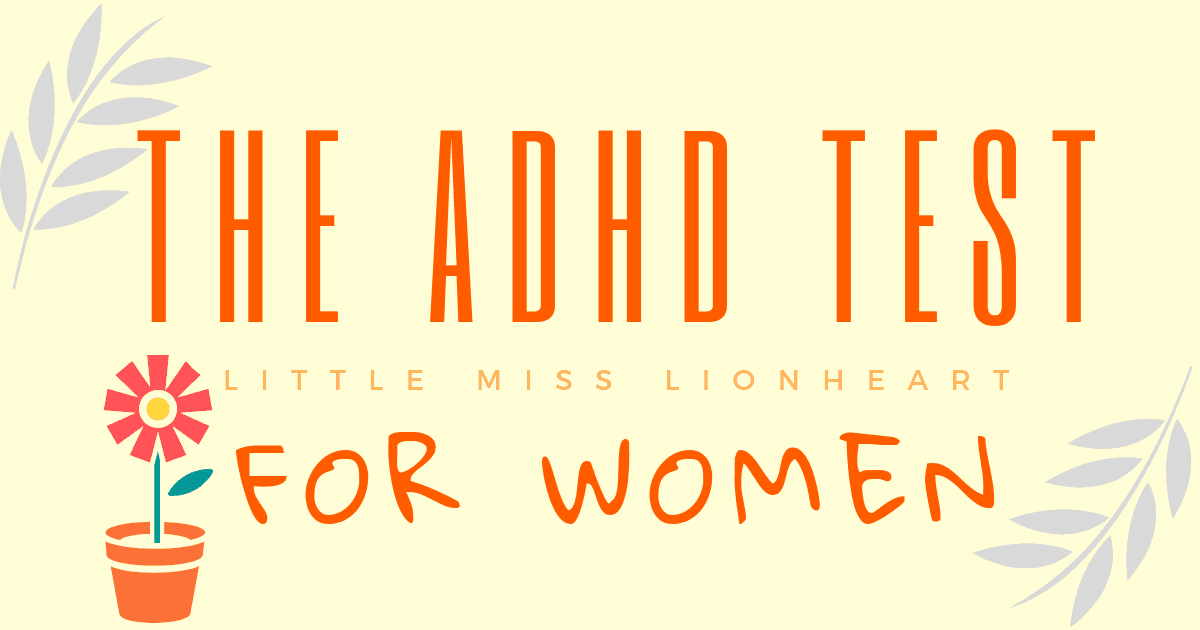
The Female ADHD Test Online is totally free and created with the experiences of real ADHD women in mind.
The test is based on the DSM 5 criteria but broken down with a few examples of how each symptom often looks for women. While it cannot diagnose you with ADHD, it can be a screening tool to provide to your doctor.
Weigh your answers carefully. It can even be helpful to get feedback from people who know you best.
Take the free Female ADHD Test:
Further Help for an Accurate Diagnosis
Doctor’s often miss ADHD in women because it looks different for us and many are under-informed about ADHD.
That’s why I designed this guide. Inside is an additional screening tool, info on how to find a knowledgeable doctor, and other conditions that mimic ADHD. It even includes research you can give to your doctor if you find them less informed than you’d hoped.
Find the guide here

After the Female ADHD Test:
If your test results indicate an ADHD possibility, it’s time to educate yourself.
Currently, the diagnostic criteria for ADHD primarily looks for symptoms of inattention and hyperactivity (makes sense based on what ADHD stands for right?).
But research shows many characteristics of ADHD that aren’t currently part of the diagnostic criteria. Things like…
Related: Is ADHD real?
ADHD Interest Based Nervous System
Our nervous systems prioritize things that fascinate us– to the exclusion of all else. At the same time, it makes it unnecessarily difficult for us to do the other (more important things) that we need to do.
ADHD Emotional Flooding
Emotions can hit hard and fast, completely flooding our brain. Doctors and therapists who aren’t as familiar with the research often misdiagnose this as an atypical mood disorder or even Bipolar disorder. Research, however, shows that emotion dis-regulation goes hand in hand with ADHD.
ADHD and Rejection Sensitive Dysphoria.
Individuals with ADHD often have intense, whole body reactions to experiences or perceptions of rejection and criticism. That’s Rejection Sensitive Dysphoria.
Related: What You Need to Know about Rejection Sensitive Dysphoria
Sometimes ADHD Hides in other Diagnoses or Labels
I’m a therapist and I had no idea I had ADHD until I was 28 years old. It hides so well under other names and labels and it’s easily missed, even by professionals like me. Here are some common places ADHD hides.
For the longest time, mine was called anxiety. If you want a more detailed understanding of WHY ADHD is often mistaken for anxiety, you’ll find that here and here.
ADHD Truths You Need to Hear
I’ve got a list of things I think everybody with ADHD needs to hear but are rarely talked about. It’s a great place to start for the newly diagnosed.
Read it here: 5 Things Every ADHD Needs to Hear
Sometimes a person doesn’t show obvious signs of ADHD until their responsibilities increase.
A kid may do well in grade school but struggle in college. They will have some of the symptoms but those symptoms don’t create major obstacles until later.
Related: When You Aren’t Living Up to Your Potential
Many people with ADHD are impulsive in spending habits, frequently changing jobs, hobbies, etc…
but the diagnostic criteria largely alludes to impulsiveness in the form of social interactions. You know, those questions about blurting things out, talking a lot, and interrupting people.
It’s helpful to know that these features are present within ADHD even though they aren’t on the test.
Share The Female ADHD Test Online
Women with ADHD are usually misdiagnosed with something else. Research indicates that up to 75% of women with ADHD don’t know they have it yet. It looks different in women and girls, which is why I created this female ADHD test, to help you better understand and share with your doctor or therapist.
ADHD impacts our self esteem, disrupts relationships, and creates emotional turmoil. Many times, doctors treat these symptoms with antidepressants. Unfortunately, they don’t do much for ADHD.
We have to change that! Share the ADHD Test for Women on your social media profile to help inspire change and spread the awareness! Women suffer in silence and it’s time that we end that. Help me spread the word, okay?
For a Fun way to learn and share the symptoms, check out ADHD Explained on TV

